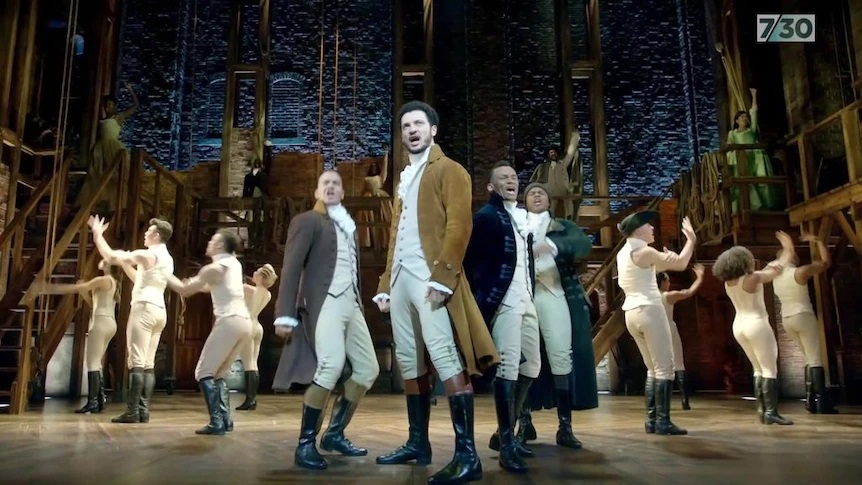Hamilton: An American Musical charts the rise and fall of one of America’s founding fathers, from 'A bastard, orphan, son of a whore'[1] to founder of the US financial system, New York Post, US Coastguard and right-hand man to President George Washington. The show has received glowing reviews from the Obamas[2] and the Duke and Duchess of Sussex[3] not to mention that the songs are so fantastic that even BBC Radio 2 (in the UK) plays them.

Courtesy of ABC
However, beyond the glitz and glamour there are important lessons in the story of Alexander Hamilton:
'If you stand for nothing Burr, then what will you fall for?'[4]
This is the greatest lesson for PME in Hamilton: people must have conviction, in something, in anything, if they want to make an impact, especially if they want to lead. For Hamilton his convictions drive him forward in all that he does. They drive him to study, to join the revolution, to write and to debate. His convictions get him noticed, for good and bad; George Washington makes him his secretary[5] while Thomas Jefferson divides the US government in opposition to him[6].
This is a big lesson for us because we all too often turn PME into a single, mandatory event in a rushed timetable. We are not great at the longevity of PME because that requires individual conviction to follow it through. I can speak from personal experience of PGCE (UK teaching qualification) essays that felt like chores because I wasn’t excited by the topics. But once I found my conviction that turned entirely on its head. Essays became exciting dives into new ideas and I actively wanted to find out more. If we can create a culture that breeds conviction, through encouraging all our people to have ideas and opinions and to share them widely, then our PME would drive itself and create leaders with vision along the way.
For Hamilton, conviction breeds respect. In the election of 1800 he backs Jefferson’s nomination over Aaron Burr on the basis that Jefferson stands for something but Burr stands for nothing[7]. He wants someone with conviction to lead, not someone who just wants to lead. Burr’s reluctance to take a position on issues is the opposite of Hamilton’s conviction; his advice on meeting Hamilton is to 'talk less, smile more. Don’t show them what you’re against or what you’re for'[8]. Burr is shown as the epitome of a careerist who doesn’t want to rock the boat for fear of being on the wrong side of an argument. He avoids debates and refuses to write in support of the constitution when Hamilton asks for his support. Again, there are lessons for us here. Burr’s career smiles only get him so far and ultimately his impact on history is limited to being the 'damn fool' that shot Hamilton. If we valued conviction in the same way as Hamilton values it, individuals would have more impetus to engage in PME of their own accord.
'The man is non-stop!'[9]
Those around Hamilton are in awe of his rise, from penniless orphan on a hurricane devastated Caribbean island to an architect of the new US government. How do they explain this? His non-stop reading, writing and debating. This probably isn’t the most revolutionary lesson: hard work pays off. But when it comes to how we conduct PME there is something here. Hamilton doesn’t just go to university and decide he is trained and educated forever, nor does the fledgling American government don’t hold annual PME weeks. Instead Hamilton’s development is as constant as it is personal. He reads about new ideas, he takes part in new debates and he writes to create new processes. He is constantly active in developing himself and driving forward change, and that is why he gains the influence he has.
While there is probably no need to write 50 plus essays in six months, as Hamilton did in his Federalist Papers, PME is most effective when it is a process that combines with the everyday. It is also most effective when people can actively engage with, interrogate and even create their own ideas. For PME like this, there would need to be a cultural shift in our willingness to engage. Not just by those being educated by it, but by their peers, leaders and followers. 'What do you think about x…?' should be the most asked question in the brew room, at lunch and when walking into any office.
Again Hamilton shows us this in action. His friends – John Laurens, Hercules Mulligan and Marquis de Lafayette – push him constantly to debate, shown fantastically in the song 'My Shot'[10]. His detractors relish the opportunity to try to outwit him, usually without success, as shown in 'Cabinet Battle #1'[11]. George Washington too sets this culture as leader, actively mentoring Hamilton, even when this is the last thing the man who 'wants to fight, not write' wants.
'In the eye of the Hurricane there is quiet'[12]
While initially a little over eager in his decision making, as Hamilton grows he learns his final PME lesson: that the journey is senseless without reflection. In the face of tough decisions, the more matured Hamilton takes time to reflect on how he got to where he was. He understands that his previous experiences have influenced his actions and decisions. He is able to put his current predicament into context. He understands that he has a raison d’etre and rather than push against this, he works with it.
Possibly the greatest act of reflection in Hamilton though comes from George Washington in the song 'One Last Time'[13]. With Jefferson set to oppose him in a Presidential race, Washington is able to stop and take stock. Rather than let his ego rule, he takes the time to understand the implications of his next actions and turns the fledgling nation from 'Strong Man' politics to a genuine constitutional democracy – 'the nation learns to move on, it outlives me when I’m gone'. Having this reflective ability makes Washington a true leader and learner, something we should all aspire to achieve through our PME.
'By working a lot harder, by being a lot smarter, by being a self-starter'
PME is core to the profession of Arms in any armed force: it is what turns the job into a profession. However it should always be an evolving process that requires us to actively engage it rather than passively letting it roll over us. Hamilton achieves all he does because the one thing he is unwilling to do is sit back and let the world, and his chosen professions (Arms, Law, Government), wash over him[14]. He is actively engaged, learning and creating all the time. Hamilton shows that professional education is not a fixed bank of information but an ever growing and changing conversation that needs new voices to feed into it.
There is a wider lesson here too: the conviction that Hamilton demonstrates makes him a visionary leader. Leadership is differentiated from management because it is visionary; a leader sets out their stall so that their decisions and those of their followers can fall from their vision. Managers by contrast look to minimise disruption and keep the train on track. If we want to be leaders we must aspire to stand for something like Hamilton, not just smile more like Burr. And if we want our PME to help us achieve this, then there is much to learn from this prophetic musical… give it a listen.
Hamilton: An American Musical, can be listened to through Amazon Prime, Spotify, CD or the stage show (although not in Australia, yet)









